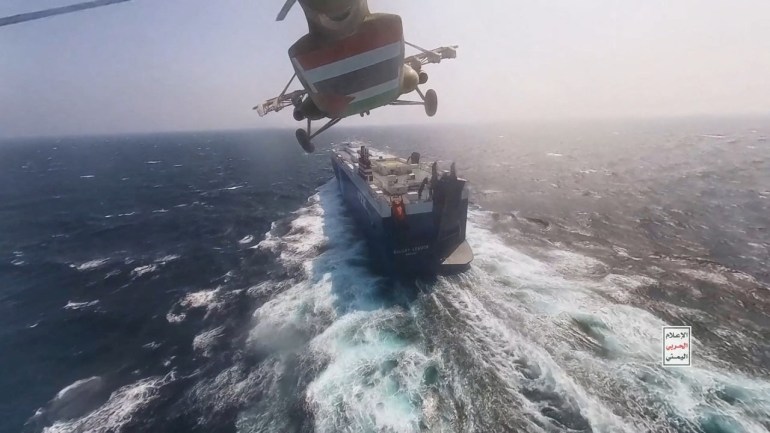And, now, the United States has used it to justify its air strikes on Houthi fighters in Yemen.
The right of a sovereign state to act in self-defence, under international law, has been thrust into the spotlight in recent months as four concurrent conflicts and humanitarian crises – in Gaza, Lebanon, Syria and Yemen – threaten all-out war in the Middle East.
This week, however US Senator for Virginia Tim Kaine cast doubt on American claims that US-led air strikes on Houthi targets, done in retaliation for Red Sea attacks on commercial vessels the group claims are linked to Israel, constitute “self-defence”.
The Houthis – an Iranian-backed armed group based in Yemen – launched their campaign of maritime attacks last year in solidarity with the people of Gaza. This included an assault on November 19, when Houthi commandos travelling by helicopter hijacked not a US vessel, but a Japanese-operated cargo ship on the Red Sea with alleged links to an Israeli businessman.
Since then, the Houthis are believed to have launched nearly 60 attacks on commercial and military ships flying under the flags of numerous different countries and operating in the Red Sea and the Gulf of Aden.
The US-led strikes on the Houthis – who control large parts of Yemen, including its capital, Sanaa – commenced on January 11 and have concentrated on Houthi storage facilities, radars and air-defence systems.
More than 230 Houthi targets in Yemen have been struck by the US-led operation since last month in a bid to curtail the group’s military strength.
Why does the US say these attacks constitute ‘self-defence’?
The US, which reclassified the Houthis as a Specially Designated Global Terrorist (SDGT) entity on January 17, says assaults on US commercial and military ships in the Red Sea constitute an assault on the US itself. Biden has called the actions of the Houthis “outrageous”.
While some assaults carried out by Houthi fighters have indeed targeted US ships, however, not all have been on American vessels.
After the US began its military campaign last month, John Kirby, now the White House national security communications adviser, claimed that the US was “not looking to expand this. The Houthis have a choice to make and they still have time to make the right choice, which is to stop these reckless attacks”.

What did Senator Kaine say?
Kaine, a Democrat who was Hillary Clinton’s running mate in the 2016 US Presidential election, expressed his doubts about the US claim to self-defence at a Senate Foreign Relations Committee hearing on Tuesday this week.
He claimed that President Biden’s legal justification for US attacks on Houthis in Yemen was “laughable”.
“A narrow mission to defend US shipping, both military and commercial – that is Article 2 self-defence,” said Kaine, referring to the US Constitution. “Article 2 self-defence means you can defend US personnel, you can defend US military assets, you probably can defend US commercial ships. But the defence of other nations’ commercial ships in no way – and it’s not even close – that’s not self-defence.”
He continued: “If you’re defending the commercial ships of other nations, it is in my view laughable to call that self-defence.”
What is Article 2 and is it relevant here?
Under Article 2 of the US Constitution, the president has the authority to take military action in “self-defence” without approval from Congress.
But the senator from Virginia was just one of several committee members questioning the legitimacy of Biden’s claim that US retaliatory air strikes against targets in Yemen constitute acts of self-defence, especially in light of the fact that Houthi attacks were largely on international, not American, vessels.
US Senator for Connecticut Chris Murphy also appeared to reject Biden’s “self-defence” justification when he said: “This looks to me like war in every bit of the constitutional sense.
“We have engaged in multiple rounds of strikes, we have a limited number of boots on the ground, we have taken casualties, we have prisoners – I’m having a hard time understanding why this does not require a traditional, congressional war authorisation.”
As a “military action”, Murphy said, Congressional approval is necessary to “legalise the existing operations but also to guard against an unauthorised mission creep”.
So can the US be considered to be acting in self-defence?
Neve Gordon, a professor of international law and human rights at Queen Mary University of London, said the US should also consider the principles of the United Nations Charter when it comes to answering this.
Article 51 of the UN Charter, Gordon said, “suggests that if a ship, whether commercial or military, carrying the US flag is attacked, then the US can respond in self-defence”.
However, he added: “The US cannot protect commercial ships carrying other flags, and any [US] attack [on Houthi targets] precipitated by a Houthi strike against a non-US ship is in violation of the UN Charter.”
What other constraints are there on a US president regarding military action?
Other than the US Constitution, a president’s use of military force is also constrained by the so-called War Powers Resolution.
This is a check on presidential power that was passed by Congress in 1973 in the aftermath of the Vietnam War.
Crucially, the resolution requires a sitting US president to terminate hostilities within 60 to 90 days unless they gain the backing of Congress.
Referring to the War Powers Resolution, a 2019 Congressional Research Service report reads: “Section 4(a)(1) requires the President to report to Congress any introduction of US forces into hostilities or imminent hostilities. When such a report is submitted, or is required to be submitted, Section 5(b) requires that the use of forces must be terminated within 60 to 90 days unless Congress authorises such use or extends the time period.”
Therefore, if the US air strikes on Yemen’s Houthis cannot be considered “self-defence”, Biden would be required to win congressional support for his campaign of attacks by April 11.
